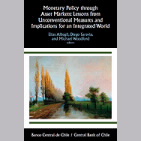Volumen 24, Serie Banca Central: Monetary Policy through Asset Markets: Lessons from Unconventional Measures and Implications for an Integrated World
Publicaciones
Volumen 24: Monetary Policy through Asset Markets: Lessons from Unconventional Measures and Implications for an Integrated World
Descripción
The global financial crisis of 2008 and its aftermath brought many new challenges for the world’s central banks. These new challenges have resulted, in turn, in bold experimentation—not just the vigorous application of traditional policy tools, but the use of new ones, or at least ones that were rarely resorted to in the decades leading to the crisis. Now that the most urgent stages of the crisis are in the past, the central banks of many countries need to take stock of the lessons learned during this period of experimentation.
To what extent have we learned that, at least during times of crisis, the central bank’s toolkit should be bigger than the one that was regarded as sufficient during the years of the “Great Moderation”?
To what extent have we learned the uses of additional tools that should become routine aspects of the conduct of monetary policy, even when the financial sector is not subject to unusual stress? What do we know about the effects of using these new tools, and what role should they play in the years to come?
The nineteenth annual conference of the Central Bank of Chile conference series addresses these issues, bringing together a distinguished multinational group of scholars to discuss the latest research findings. The structure of the conference consists of three sessions, each addressing a different aspect of the new issues raised by the unconventional monetary policies of recent years.
Editors
Elías Albagli
Diego Saravia
Michael Woodford
This conference volume by the Central Bank of Chile puts together an impressive list of papers, many of which will surely become classics. This is a must read for scholars and policy makers who want to understand the frontier of thinking about monetary policy.
Tobias Adrian
Federal Reserve Bank of New York
The variety of unconventional measures undertaken by central banks during the Great Recession has moved monetary policy into a brave new world. While there is a rough consensus that these measures played a critical role in mitigating the crisis, we still do not have complete understanding of how they worked and how they should be used in the future. This first rate volume edited by Elías Albagli, Diego Saravia and Michael Woodford takes an important step in filling in the gaps in our knowledge. The papers provide exciting new theoretical and empirical work. This volume should be on the shelf of anyone interested in understanding the dramatic transformation of monetary policy.
Mark Gertler
New York University
Monetary policy has entered uncharted territory. International asset markets transmit monetary impulses across the globe in ways which we yet have to fully understand. This volume gathers many of the leading academics working on this important question. It is the ultimate guide to further our understanding of how financial markets and monetary policy interact on a global level to shape the novel macroeconomic environment we live in.
Hélène Rey
London Business School
Volumen 24: Monetary Policy through Asset Markets: Lessons from Unconventional Measures and Implications for an Integrated World
Recuadros y gráficos

